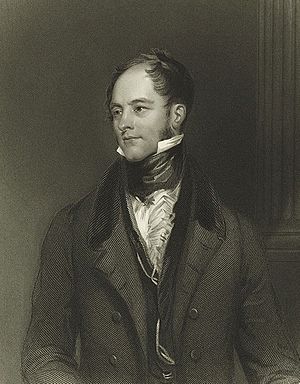Henry Goulburn facts for kids
Quick facts for kids
Henry Goulburn
|
|
|---|---|
 |
|
| Chancellor of the Exchequer | |
| In office 26 January 1828 – 22 November 1830 |
|
| Monarch | George IV William IV |
| Prime Minister | The Duke of Wellington |
| Preceded by | John Charles Herries |
| Succeeded by | Viscount Althorp |
| In office 3 September 1841 – 27 June 1846 |
|
| Monarch | Victoria |
| Prime Minister | Sir Robert Peel, Bt |
| Preceded by | Francis Baring |
| Succeeded by | Sir Charles Wood, Bt |
| Home Secretary | |
| In office 15 December 1834 – 18 April 1835 |
|
| Monarch | William IV |
| Prime Minister | Sir Robert Peel, Bt |
| Preceded by | The Duke of Wellington |
| Succeeded by | Lord John Russell |
| Personal details | |
| Born | 19 March 1784 London |
| Died | 12 January 1856 (aged 71) |
| Nationality | British |
| Political party | Tory, Peelite |
| Spouse | Hon. Jane Montagu (died 1857) |
| Alma mater | Trinity College, Cambridge |
Henry Goulburn (born March 19, 1784 – died January 12, 1856) was an important British politician. He was a member of the Conservative Party. He held several high-ranking government jobs, including Chancellor of the Exchequer (which is like the country's chief financial officer) and Home Secretary.
Contents
Early Life and Education
Henry Goulburn was born in London on March 19, 1784. He was the oldest son of Munbee Goulburn, a wealthy plantation owner from Jamaica. His mother was Susannah, whose father was William Chetwynd, 4th Viscount Chetwynd.
Henry went to Trinity College, Cambridge for his education. For much of his life, he lived in Betchworth, a town near Dorking.
Plantation Ownership and Slavery
Henry Goulburn inherited several sugar plantations in Jamaica. The most important one was called Amity Hall. At that time, these plantations used enslaved people to do the work.
Goulburn never traveled to Jamaica himself because of his health and political duties. He had people called "attorneys" manage his estates for him. One of these managers, Thomas Samson, was known for being very cruel to the enslaved people.
By 1818, the money Goulburn earned from his Jamaican estates had dropped by half. He believed that the lives of the enslaved people had gotten better, though. In 1818, his brother visited the plantation. Thomas Samson had already been fired because of how he treated the enslaved people.
Goulburn later received money as compensation when slavery was abolished. This was part of the Slave Compensation Act 1837. The British government borrowed a large sum of money to pay slave owners. Goulburn received about £5,601 for 277 enslaved people he owned in Jamaica.
Political Career Highlights
Henry Goulburn began his political career in 1808. He became a Member of Parliament for Horsham.
Early Government Roles
In 1810, he became an Under-Secretary of State for Home Affairs. Two and a half years later, he was made Under-Secretary of State for War and the Colonies. During this time, a town in New South Wales, Australia, was named Goulburn after him.
In 1821, he joined the Privy Council. Soon after, he became the Chief Secretary for Ireland. He held this job until 1827. Even though some people didn't like him, he was generally successful. He helped pass a law about tithes (church taxes) in Ireland in 1823.
Chancellor of the Exchequer
In January 1828, Goulburn became the Chancellor of the Exchequer under the Duke of Wellington. He held this important financial role until November 1830.
As Chancellor, Goulburn helped lower the interest rate on the national debt. He also changed the rules about selling beer, making it easier for people to sell it.
Home Secretary and Second Term as Chancellor
After leaving office with Wellington, Goulburn served as Home Secretary for a few months in 1835. This was under Sir Robert Peel.
When Sir Robert Peel became Prime Minister again in 1841, Goulburn returned as Chancellor of the Exchequer. He helped lower the national debt's interest rate even more. He also supported Peel in the effort to repeal the Corn Laws. These laws had made food expensive. Goulburn left office in June 1846.
Parliamentary Seats
Goulburn represented several areas in the House of Commons. He was a Member of Parliament for:
- Horsham
- St Germans
- West Looe
- Armagh
In May 1831, he was elected to represent Cambridge University. He kept this seat until he died.
Family Life
Henry Goulburn had a younger brother named Frederick Goulburn. Frederick was the first Colonial Secretary of New South Wales in Australia.
In 1811, Henry Goulburn married Jane Montagu. She was the third daughter of Matthew Montagu, 4th Baron Rokeby. They had four children together. Henry Goulburn passed away on January 12, 1856, at the age of 71. His wife, Jane, died the following year.
 | John T. Biggers |
 | Thomas Blackshear |
 | Mark Bradford |
 | Beverly Buchanan |

